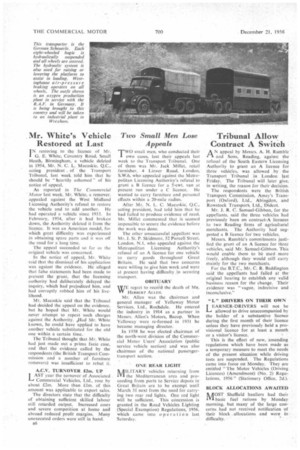. Mr. White's Vehicle Restored at Last
Page 40

If you've noticed an error in this article please click here to report it so we can fix it.
I N restoring to the licence of Mr.
G. E. White, Coventry Road, Small Heath, Birmingham, a vehicle deleted in 1954, Mr. N. C. L. Macaskie, Q.C., acting president . of the Transport Tribunal, last week told him that he should be "heartily ashamed" of his notice of appeal.
As reported in The Commercial • Motor last week. Mr. White, a remover. appealed against the West Midland Licensing Authority's refusal to restore the vehicle and to add another. He had operated a vehicle since 1933, In February, 1954, after it had broken down, the Authority deleted it from the licence. It was an American model, for which great difficulty was experienced in obtaining spare parts and it was off the road for a long time.
The appeal succeeded so far as the original vehicle was concerned.
In the notice of appeal. Mr. White said that the dismissal of' his application was against the evidence, He alleged that false statements had been made to prevent the grant, that the licensing authority had deliberately delayed the inquiry, which had prejudiced him, and had corruptly robbed him of his livelihood.
Mr. Macaskie said that the Tribunal had decided the appeal on the evidence. but he hoped that Mr. White would never attempt to repeat such charges against the Authority. ,,Had Mr. White known, he could have applied to have another vehicle substituted for the old one within a certain time.
The Tribunal thought that Mr. White had just made out a prima facie case, and that the evidence called by the respondents (the British Transport Commission and a number of furniture removers) was insufficient to rebut it.
A.C.V, TURNOVER £2m. UP
LAST year the turnover of Associated Commercial Vehicles, Ltd., rose by about £2m. More than Ulm, of this amount was applicable to export sales.
The directors state that the difficulty of obtaining sufficient skilled labour still retarded output. Increased costs and severe competition at home and abroad reduced profit margins. Many unexecuted orders were still in hand.
B6




























































































